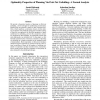Free Online Productivity Tools
i2Speak
i2Symbol
i2OCR
iTex2Img
iWeb2Print
iWeb2Shot
i2Type
iPdf2Split
iPdf2Merge
i2Bopomofo
i2Arabic
i2Style
i2Image
i2PDF
iLatex2Rtf
Sci2ools
AIPS
2009
2009
Optimality Properties of Planning Via Petri Net Unfolding: A Formal Analysis
We provide a theoretical analysis of planning via Petri net unfolding, a novel technique for synthesising parallel plans. Parallel plans are generally valued for their execution flexibility, which manifests as alternative choices for the ordering of operators and potentially faster plan executions. Being a relatively new approach, the flexibility properties of plans synthesised via unfolding, and even the concurrency semantics supported by this technique, are particularly unclear and only understood at an informal level. In this paper, we first formally characterise the concurrency semantics of planning via unfolding as a further restriction on the standard notion of independence. More importantly, we then prove that plans obtained using this approach are optimal deorderings and optimal reorderings in terms of the number of ordering constraints on operators and plan execution time, respectively. These results provide objective guarantees on the quality of plans obtained by the unfoldi...
| Added | 08 Nov 2010 |
| Updated | 08 Nov 2010 |
| Type | Conference |
| Year | 2009 |
| Where | AIPS |
| Authors | Sarah L. Hickmott, Sebastian Sardiña |
Comments (0)

